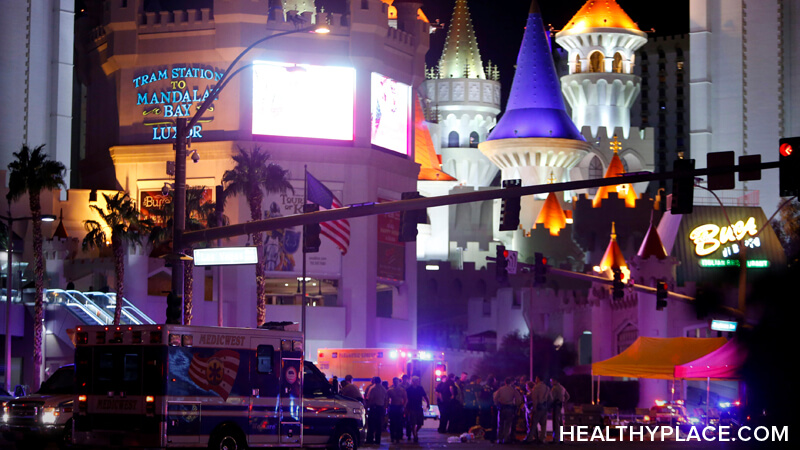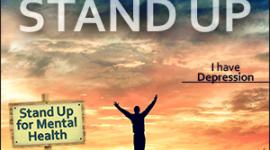Traumatic Stress, Psychological Strain after a Tragedy
Here's what's happening on the HealthyPlace site this week:
- Traumatic Stress, Psychological Strain after a Tragedy
- Las Vegas Shooting and Traumatic Stress
- From the HealthyPlace Mental Health Blogs
- Video: Bipolar and Relationships: Quit Using My Bipolar Against Me
- Video: Shame, Stigma Keeps Us from Getting Depression Treatment
- Most Popular HealthyPlace Articles Shared by Facebook Fans
- Mental Health Quote
------------------------------------------------------------------
Las Vegas Shooting: Dealing with the Worst Mass Tragedy of Our Time
The enormity of the Las Vegas shooting has left many people traumatized. Join our Facebook Live at 7p CT/ 8 ET tonight to share your feelings and experiences. Therapist, Emily Roberts, will be answering your questions and providing ideas on how to cope with the trauma related to this national tragedy. I hope to see you there and please feel free to invite others or share this on your social media. Our Facebook page is: Facebook.com/HealthyPlace
------------------------------------------------------------------

Traumatic Stress, Psychological Strain after a Tragedy
Is the Las Vegas Shooting Too Much to Deal With?
Traumatic stress, also known as psychological strain or emotional shock, is a normal human response to a traumatic event. Are you feeling upset in the aftermath of the mass shooting in Las Vegas? If so, you’re not alone. Understanding what you’re experiencing can help you deal with traumatic events and your own feelings.
It can be helpful to know what you’re experiencing so you can learn about it and face it. Possible mental health difficulties following a trauma include:
- Post-traumatic stress disorder (PTSD)
- Acute stress disorder (ASD)
- Acute stress reaction
- Traumatic stress/psychological strain/emotional shock
These conditions share much in common, but they aren’t identical. Only PTSD and ASD are diagnosable disorders found in the DSM-5. ASD lasts up to one month; PTSD lasts beyond one month. With these, someone must have been directly exposed to the trauma or have heard about it happening to a loved one.
Acute stress reaction is similar to ASD, but the reaction lasts only a few days.
Las Vegas Shooting and Traumatic Stress
If you weren’t near the scene of the Las Vegas tragedy but still feel affected, know that it’s okay and normal. Traumatic events can shake us to our core and disrupt our sense of safety and security. Among symptoms of traumatic stress are
- Fear
- Guilt (because you’re safe and others aren’t)
- Anger
- Obsessive thoughts
- Anxiety
- Depression
- Numbness
Traumatic stress is often exacerbated by constant exposure to news and social media. Stay away from these as much as possible. Seeking mental health help and support from a therapist or mental health support group can be helpful, too. You can recover.
Related Articles Dealing with Traumatic Stress
- Acute Stress Disorder Symptoms
- Acute Stress Disorder Treatment
- When Tragedy Strikes: How to Emotionally Handle Disaster
- What To Do When Current Events Cause Anxiety
- Traumatic Events and How to Cope
Your Thoughts
Today's Question: How has the Las Vegas shooting tragedy affected you and what’s helping you cope with it? We invite you to participate by sharing your thoughts, knowledge, and experiences on the HealthyPlace Facebook page and on the HealthyPlace Google+ page.
From the HealthyPlace Mental Health Blogs
On all our blogs, your comments and observations are welcomed.
- The Future of Bipolar Treatment: What I Hope Will Change
- Is Your Poor Sense of Direction a Symptom of ADHD?
- I Wanted My Abuser to Suffer
- Mindfulness While Listening to Music Improves My Mood
- Mental Health Awareness Weeks Are Important to Combat Stigma
- Struggling With OCD Can Make Moving Homes Difficult
- Protecting Minors’ Mental Health Privacy: Where’s the Line?
- Dealing with Bipolar Disorder’s Sensitivity to Sleep Changes
- Suggestions for Sleep Problems in Childhood ADHD
- Anxiety Coping Skills for Women in Deprived Neighborhoods
- Managing the Suicide Risk in Dissociative Identity Disorder
- The NAMI Walk For Schizophrenia and Schizoaffective Disorder
- Essential Steps to Binge Eating Disorder Recovery
- What Is Defusion and How Can You Use It to Reduce Anxiety?
- A Power Greater than Me Broke the Insanity of My Addiction
- How to Appreciate Success, Even When It’s Scary
Feel free to share your thoughts and comments at the bottom of any blog post. And visit the mental health blogs homepage for the latest posts.
------------------------------------------------------------------
From HealthyPlace YouTube Channel
I'm Hannah. I Have Bipolar 2
Bipolar and Relationships: Quit Using My Bipolar Against Me
When you live with bipolar disorder, or any mental health condition, having it used against you in relationships is more common than people may assume. Suddenly, everything you do or say is under a microscope. People are constantly blaming unfortunate incidences or emotional reactions on your mental health condition. It is especially difficult when it happens in a romantic relationship and it has the potential of seriously damaging a person's mental health. (Watch Hannah)
-----
I’m Veronica. This is My Life with Depression
Shame, Stigma Keeps Us from Getting Depression Treatment
Shame and the stigma of depression keep so many people from getting the depression treatment and help they need. I was one of those people. Shame kept me from asking for help and from getting better.
------------------------------------------------------------------
Most Popular HealthyPlace Articles Shared by Facebook Fans
Here are the top 3 mental health articles HealthyPlace Facebook fans are recommending you read:
- How to Cope with Self-Harm Thoughts
- Use These Holiday Stress Management Tips
- Feeling Anxious but Knowing You Shouldn’t: Bridging the Gap
If you're not already, I hope you'll join us/like us on Facebook too. There are a lot of wonderful, supportive people there.
------------------------------------------------------------------
Mental Health Quote
"Survivors of any and all abuse become very good at anticipating moods of others, looks, actions, all of it in an effort to survive. Believing that if we can be agreeable, be compliant and loving, do things how they want, that we will be safe. This becomes our way of live."
Read more abuse quotes.
------------------------------------------------------------------
That's it for now. If you know of anyone who can benefit from this newsletter or the HealthyPlace.com site, I hope you'll pass this onto them. You can also share the newsletter on any social network (like facebook, stumbleupon, or google+) you belong to by clicking the links below. For updates throughout the week, circle HealthyPlace on Google+, follow HealthyPlace on Twitter or become a fan of HealthyPlace on Facebook. Also, check out HealthyPlace on Pinterest and share your mental health pins on our Share Your Mental Health Experiences board.
APA Reference
Peterson, T.
(2017, October 3). Traumatic Stress, Psychological Strain after a Tragedy, HealthyPlace. Retrieved
on 2026, March 5 from https://www.healthyplace.com/other-info/mental-health-newsletter/traumatic-stress-psychological-strain-after-a-tragedy

